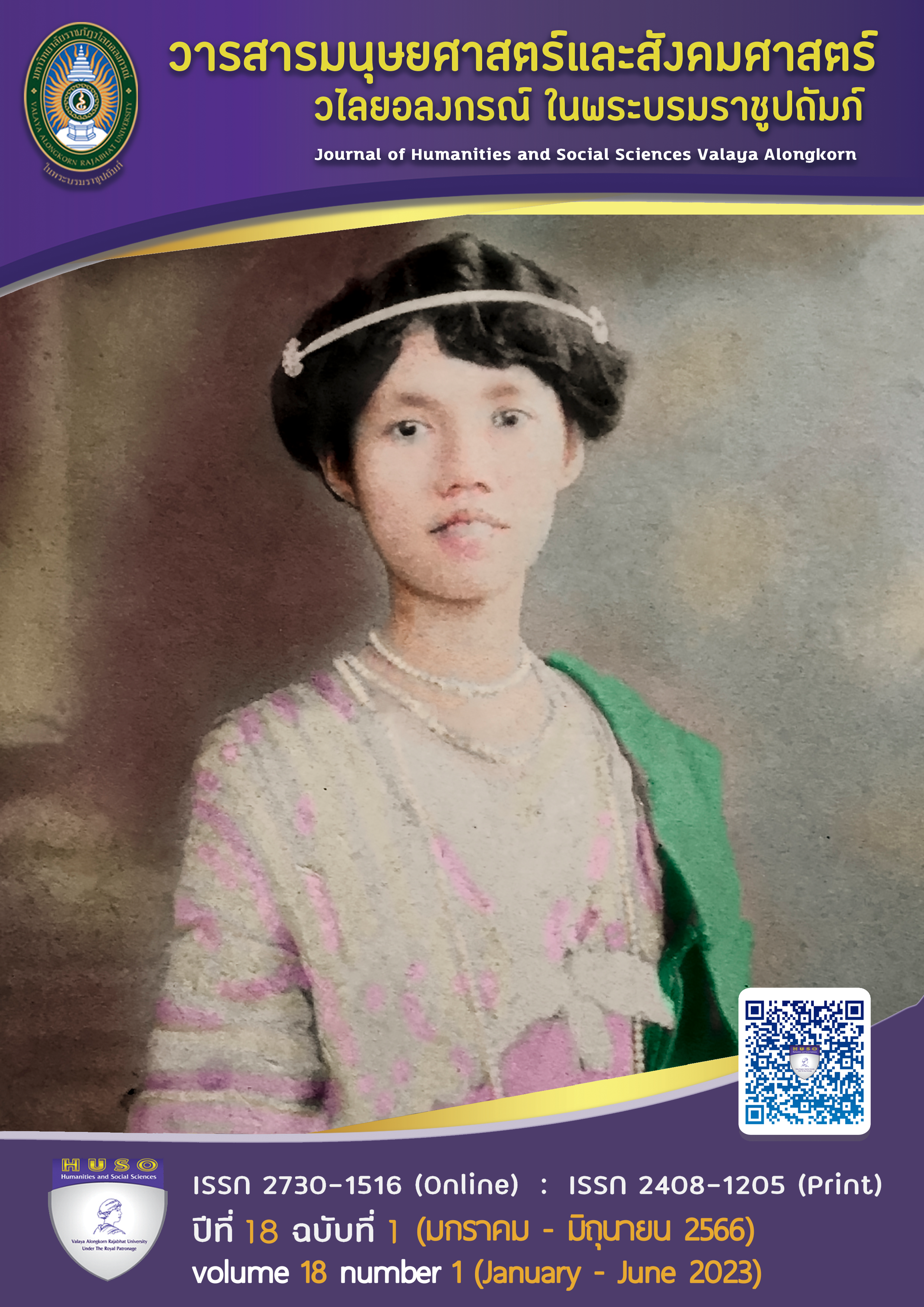THE DEVELOPMENT OF COMMUNITY LEARNING ACTIVITIES FOR HEALTH PROMOTION BASED ON LOCAL WISDOM IN SALUNG – KEELEK COMMUNITY, MAE RIM DISTRICT, CHIANG MAI PROVINCE
Main Article Content
Abstract
This mixed method research aims to develop community learning activities for health promotion based on local wisdom and assess the efficiency and achievement of such activities. Thirty-four stakeholders who reside in the Saluang-Keelek community, Mae Rim District, Chiang Mai Province, participated in the study. Data was collected through community learning activities and questionnaires. The efficiency of the learning activities was determined by the scores on the achievement test (E1/E2) based on the 80/80 percent standardized criteria, and the paired t-test. The results indicated that community learning activities, which included local wisdom for health promotion survey techniques, the development of local herbal products, and the synthesis
of local knowledge application guidelines for health care, showed efficiency regarding the standardized criteria E1/E2, which were at 80/80 percent (84.66/88.35). As for the achievement
of community learning activities, the mean scores for knowledge in post-learning activities were statistically higher than those in pre-learning activities at the level of ≤ 0.05 (p-value = 0.048). In this regard, the stakeholders suggested that the implementation of the learning activities should increase the practice and time allotted for each activity.
Article Details

This work is licensed under a Creative Commons Attribution-NonCommercial-NoDerivatives 4.0 International License.
ลิขสิทธิ์บทความวิจัยที่ได้รับการตีพิมพ์เผยแพร่ในวารสารมนุษยศาสตร์และสังคมศาสตร์ วไลยอลงกรณ์ ในพระบรมราชูปถัมภ์ ถือเป็นกรรมสิทธิ์ของคณะมนุษยศาสตร์และสังคมศาสตร์ มหาวิทยาลัยราชภัฏวไลยอลงกรณ์ ในพระบรมราชูปถัมภ์ ห้ามนำข้อความทั้งหมดหรือบางส่วนไปพิมพ์ซ้ำ เว้นแต่จะได้รับอนุญาตจากมหาวิทยาลัยเป็นลายลักษณ์อักษร
ความรับผิดชอบ เนื้อหาต้นฉบับที่ปรากฏในวารสารมนุษยศาสตร์และสังคมศาสตร์ วไลยอลงกรณ์ ในพระบรมราชูปถัมภ์ เป็นความรับผิดชอบของผู้นิพนธ์บทความหรือผู้เขียนเอง ทั้งนี้ไม่รวมความผิดพลาดอันเกิดจากเทคนิคการพิมพ์
References
กนิษฐา พวงศรี. (2560). ผีล้านนา อำนาจไร้รูปสู่รูปลักษณ์ในงานทัศนศิลป์. วารสารวิชาการคณะสถาปัตยกรรมศาสตร์ สจล, 24(1), 131–140.
ชัยยงค์ พรหมวงศ์. (2556). การทดสอบประสิทธิภาพสื่อหรือชุดการสอน. วารสารศิลปากร ศึกษาศาสตร์,
(1), 7–20.
บัวหลวง ใจดี, และพุฒิพงศ์ สัตยวงศ์ทิพย. (28, มีนาคม). การพัฒนากิจกรรมการสร้างเสริมสุขภาพ
ของสมาชิกชมรมผู้สูงอายุโดยการมีส่วนร่วมของชุมชน ตําบลหนองตะไก้ อําเภอสูงเนิน จังหวัดนครราชสีมา. ใน สุรศักดิ์ วงศ์รัตนชีวิน (ประธาน). การประชุมเสนอผลงานวิจัยระดับบัณฑิตศึกษาแห่งชาติ [Symposium]. มหาวิทยาลัยขอนแก่น.
พเยาว์ พงษ์ศักดิ์ชาติ, ชุติมา มาลัย, นิตติยา น้อยสีภูมิ, และมนัสวี จำปาเทศ. (2562). การส่งเสริมสุขภาพตามภูมิปัญญาท้องถิ่น. วารสารพยาบาลทหารบก, 20(3), 44-53.
มุจลินทร์ แปงศิริ. (2558). การพัฒนารูปแบบการสร้างเสริมสุขภาพผู้สูงอายุโดยบูรณาการภูมิปัญญาท้องถิ่น และการมีส่วนร่วมของชุมชน องค์การบริหารส่วนตำบลบ้านกลาง ตำบลบ้านกลาง อำเภอสันป่าตอง จังหวัดเชียงใหม่ .วารสารวิจัยราชภัฏเชียงใหม่, 16(2), 88 – 96.
สามารถ ใจเตี้ย. (2561). วัฒนธรรมสุขภาพล้านนาเพื่อการดูแลสุขภาพ. ธรรมศาสตร์เวชศาสตร์,
(2), 240–248.
สามารถ ใจเตี้ย, ณัทธร สุขสีทอง, จันจิราภรณ์ จันต๊ะ, และฉัตรศิริ วิภาวิน. (2563). ความรู้ ความต้องการการสร้างเสริมสุขภาพผู้สูงอายุด้วยภูมิปัญญาพื้นบ้านล้านนา องค์การบริหารส่วนตำบลสะลวง อำเภอแม่ริม จังหวัดเชียงใหม่. วารสารการแพทย์แผนไทยและแพทย์ทางเลือก, 18(2), 372–379.
Demio, A. (2011). Local wisdom and health promotion: barrier or catalyst?, Asia Pacific Journal of Public Health, 23(2),127- 132.
Ebel, R.L. and Frisbie, D.A. (1986). Essentials of Educational Measurement (5 th Ed). Prentice-Hall: Englewood Cliffs.
Marlina, M., Badaruddin, B., Fikarwin, Z. and Rahayu, L. (2020). The implementation of local wisdom to improve the health and quality of life the hypertension family as a new strategy for early prevention of stroke. Global Journal of Health Science, 12(2), 51–60.
Raeburn, J., Akerman, M., Chuengsatiansup, K., Mejai, F., Oladepo, O. (2007). Community capacity building and health promotion in a globalized world. Health Promotion International, 21(Suppl 1), 84 – 90.
Wessner, DR. (2010). A review of the wisdom of whores: bureaucrats, brothels and the business
of aids. Journal of Microbiology & Biology Education, 11(2), 185 – 186.


